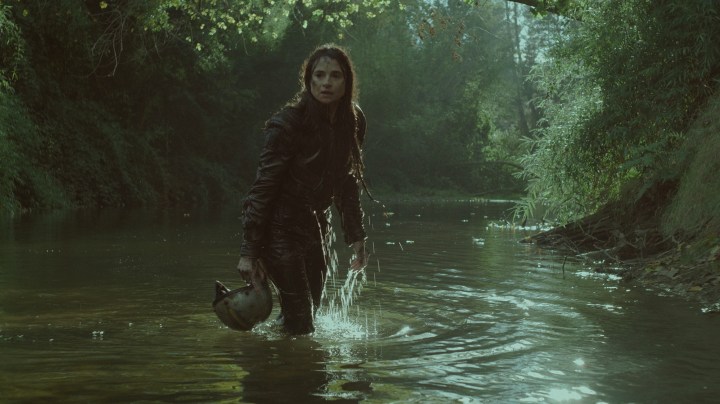Francisca Alegría Talks ‘The Cow Who Sang a Song Into the Future,’ & Women’s Role in Movie Industry

Courtesy of Sundance Institute
It’s been 5 years since Francisca Alegría won Sundance’s short film jury award with her short And the Whole Sky Fit in the Dead Cow’s Eye, and it’s been nothing but a wild ride since then. The Chilean filmmaker’s feature debut The Cow Who Sang a Song Into the Future premiered at the 2022 Sundance Film Festival and it’s just as mystical and heartbreaking as one could expect.
Alegría’s role as a Latine woman in the movie industry is an important part of her journey. “Whether willingly or not, we’re still minimized, infantilized, both as Latinas and even more so as women,” she declares, reflecting on how while there’s a lot of talk about being more inclusive in the industry, it’s still more of a speech than real actions. Thankfully she’s found support in countless women around her. “Nowadays there’s a lot of devotion and fellowship between Latina filmmakers, which wasn’t so common in the past,” she tells Remezcla, revealing how working with a powerful team of females on her crew was key to creating the universe she had in her mind.
Her new film delves into that limbo-like zone that lives somewhere beyond what our basic human senses can perceive, in a magical realism meets mother-earth homage sort of universe where the wounds that broke a family’s bond resurface the day Magdalena (Mia Maestro) comes back to life.
The story’s set in the south of Chile, where a pulp mill is contaminating the Cruces River leading to thousands of dead fish washing up on the shore. Whilst their corpses sing a soul-stirring song, Magdalena’s gasping body arises from the water decades after she allegedly took her own life, to pay a visit to her widowed husband (Alfredo Castro) and her now-adult children Cecilia (Leonor Varela), and Bernardo (Marcial Tagle), catalyzing a climax on both the environment and the family.
As Cecilia travels back to their hometown to take care of his now sick father, Bernardo takes command of the family’s dairy farm, and while they’re both skeptical about her mother’s alleged resurrection, it’s a matter of time before they eventually catch sight of her ghost, exposing the family’s struggles and hidden pain.
While it may sound like a thriller at first, there’s no paranormal terror nor desire for revenge carrying the story. The horrors Alegría portrays are those caused by humankind — the environmental, legislative, and familial atrocities that rule today’s society and threaten everything around us.
Back in her days as a student at Columbia, Alegría found herself reading about mass animal deaths in Chile and the world, which sparked a fire in her. “Suddenly these multitudinous deaths of breathing, feeling beings due to humans’ careless actions filled me up with rage, with impotence, and I realized that’s what I wanted to talk about,” she says.
The Cow Who Sang a Song Into the Future is not a moral-of-the-fable kind of movie though. “The story speaks about very subtle topics and uses a very feminine language that can’t really be explained with words,” Alegría states, which allows viewers to come up with their own interpretation. Using her own language and staying true to herself, Alergía’s folkloric fable manages to tie generational trauma and the environmental crisis together, providing us with a magnifying glass to explore both human and ecological despair.
The Cow Who Sang a Song into the Future premiered at the 2022 Sundance Film Festival. It is currently seeking U.S. distribution.